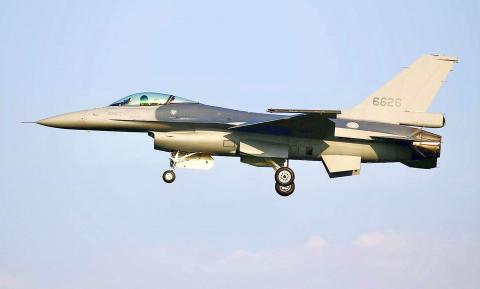The air force yesterday received its first upgraded Lockheed Martin F-16V, the latest variant of the jet, at the Shueishang Airbase in Chiayi County, with three more expected to arrive by the end of the year.
The air force has budgeted NT$129.6 billion (US$4.18 billion) for Aerospace Industrial Development Corp (漢翔航空工業) and US-based Lockheed Martin Corp to upgrade its 143 F-16A/Bs to F-16V standard.
The jet received yesterday had completed hardware and software upgrades in June, and was first spotted by aviation enthusiasts after it began flight tests at the end of August, sources said.

Photo: Yu Tai-lang, Taipei Times
News at the time drew great concern from the Ministry of National Defense and the US, sources said, adding that a full-scale investigation of intelligence and counter-espionage systems were launched to identify the leak.
The air force said it expects that the upgrades would complete outfitting 20 to 24 jets per year until 2022.
Most of the F-16V jets would be repainted and their markings would be refurbished in Shueishang and at the Sincheng Airbase in Hualien County after they arrive to prevent spies from identifying which planes have been upgraded, the air force said.
Since the purchase of 150 F-16A/B jets in 1992, the plane has become the air force’s primary fighter in terms of air-to-air, air-to-sea and air-to-surface defenses.
With the growing disparity of air forces on either side of the Taiwan Strait, the US in 2011 agreed to upgrade Taiwan’s F-16s to one of the most advanced variants of the F-16 family, sources said.
Outfitted with an AN/APG-83 active electronically scanned array and a new modular mission computer, the F-16V has an improved radar detection range and multi-target engagement capability, the ministry said.
The fighters are to have a helmet-mounted cue system linked to AIM-9X Sidewinder heat-seeking missiles, giving pilots the ability to “see and shoot,” it said.
Other advanced weapons the F-16Vs are to carry include the AGM-154C joint standoff weapon — or glide bomb — and AGM-88B high-speed anti-radiation missiles, it added.

ENDEAVOR MANTA: The ship is programmed to automatically return to its designated home port and would self-destruct if seized by another party The Endeavor Manta, Taiwan’s first military-specification uncrewed surface vehicle (USV) tailor-made to operate in the Taiwan Strait in a bid to bolster the nation’s asymmetric combat capabilities made its first appearance at Kaohsiung’s Singda Harbor yesterday. Taking inspiration from Ukraine’s navy, which is using USVs to force Russia’s Black Sea fleet to take shelter within its own ports, CSBC Taiwan (台灣國際造船) established a research and development unit on USVs last year, CSBC chairman Huang Cheng-hung (黃正弘) said. With the exception of the satellite guidance system and the outboard motors — which were purchased from foreign companies that were not affiliated with Chinese-funded

PERMIT REVOKED: The influencer at a news conference said the National Immigration Agency was infringing on human rights and persecuting Chinese spouses Chinese influencer “Yaya in Taiwan” (亞亞在台灣) yesterday evening voluntarily left Taiwan, despite saying yesterday morning that she had “no intention” of leaving after her residence permit was revoked over her comments on Taiwan being “unified” with China by military force. The Ministry of the Interior yesterday had said that it could forcibly deport the influencer at midnight, but was considering taking a more flexible approach and beginning procedures this morning. The influencer, whose given name is Liu Zhenya (劉振亞), departed on a 8:45pm flight from Taipei International Airport (Songshan airport) to Fuzhou, China. Liu held a news conference at the airport at 7pm,

Taiwan was ranked the fourth-safest country in the world with a score of 82.9, trailing only Andorra, the United Arab Emirates and Qatar in Numbeo’s Safety Index by Country report. Taiwan’s score improved by 0.1 points compared with last year’s mid-year report, which had Taiwan fourth with a score of 82.8. However, both scores were lower than in last year’s first review, when Taiwan scored 83.3, and are a long way from when Taiwan was named the second-safest country in the world in 2021, scoring 84.8. Taiwan ranked higher than Singapore in ninth with a score of 77.4 and Japan in 10th with

GRIDLOCK: The National Fire Agency’s Special Search and Rescue team is on standby to travel to the countries to help out with the rescue effort A powerful earthquake rocked Myanmar and neighboring Thailand yesterday, killing at least three people in Bangkok and burying dozens when a high-rise building under construction collapsed. Footage shared on social media from Myanmar’s second-largest city showed widespread destruction, raising fears that many were trapped under the rubble or killed. The magnitude 7.7 earthquake, with an epicenter near Mandalay in Myanmar, struck at midday and was followed by a strong magnitude 6.4 aftershock. The extent of death, injury and destruction — especially in Myanmar, which is embroiled in a civil war and where information is tightly controlled at the best of times —